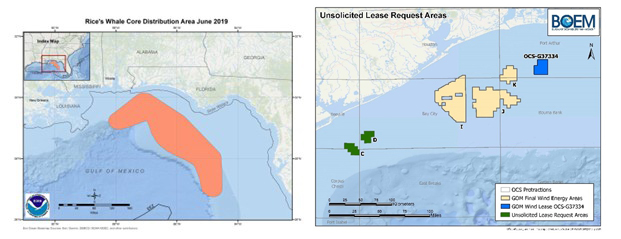By Joe Murphy, National Wildlife Federation
A disturbing trend has emerged lately in 2025: the chipping away at critical protections for endangered species who depend on our policies for their survival, which threatens to lead severely imperiled species to extinction. Most recently, efforts have been made to roll back protections for Rice’s whales in the Gulf by rescinding guidance for oil and gas industry ships to slow down while passing through their habitat.
The same advocates for these rollbacks are often opponents of offshore wind energy who claim that survey activities harm or even kill whales. However, there is no evidence to link large whale deaths to any offshore wind activities. In Gulf waters, where there is substantial existing energy infrastructure and activities, it is especially important to understand that the sounds produced by offshore wind surveys are significantly lower in intensity and impact than those generated by oil and gas or military activities.

Recognizing the importance of protecting Rice’s whales, the National Wildlife Federation urged the Bureau of Ocean Energy Management to exclude known Rice’s whale habitat from consideration during the Gulf’s offshore wind leasing process. As a result of these early comments, offshore wind activity will take place far from Rice’s whale habitat and will be less generally impactful than oil and gas development.
As offshore wind developers draft construction and operations plans, the National Wildlife Federation and our partners advocate for risk reduction measures including foundations that require less pile driving (or none), bubble curtains to reduce construction noise, large separation distance requirements between vessels and marine mammals, vessel speed restrictions, trained observers, thermal and acoustic detection systems on board, and limiting impactful activities during times of highest risk.
Since these whales may spend a considerable amount of time at night within draft depths of most commercial vessels, we also provide recommendations to avoid nighttime transit through their habitat and construction operations under low visibility conditions.

Although no form of energy generation is free from impacts, renewable energy such as offshore wind offers a valuable opportunity to reduce emissions over the long term, transition our energy economy, enhance energy independence and minimize harm to wildlife.
By implementing science-backed mitigation measures, we can advance offshore wind while safeguarding Rice’s whales and the broader Gulf ecosystem. This offers an opportunity for responsible energy production balanced against protecting one of the most iconic species in the Gulf.
This is the forward thinking and renewable energy production we must seek and implement. Surely, we have the grace and wisdom to take measures to ensure another species can survive as we secure a renewable energy future.
Joe Murphy is a wildlife policy specialist for the National Wildlife Federation. Banner photo: A Rice’s whale observed in the western Gulf during an aerial survey in 2024. (Credit: NOAA Fisheries/Paul Nagelkirk, Permit #21938).
Sign up for The Invading Sea newsletter by visiting here. To support The Invading Sea, click here to make a donation. If you are interested in submitting an opinion piece to The Invading Sea, email Editor Nathan Crabbe at ncrabbe@fau.edu.



